The silence of the inferno
Petrogao, Portugal -- It was strangely calm and silent. You could just hear the crackling wood and that very particular sound of uncontrolled flames. I noticed the reflection of the inferno in the water of the nearby pond and snapped away. It was like a typical postcard of pretty scenery -- except that reflected in the still waters was a forest being consumed by a killer fire.
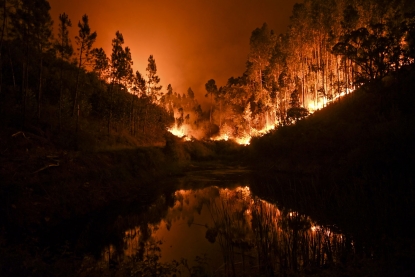 A wildfire is reflected in a stream at Penela, Coimbra, central Portugal, on June 18, 2017.
(AFP / Patricia De Melo Moreira)
A wildfire is reflected in a stream at Penela, Coimbra, central Portugal, on June 18, 2017.
(AFP / Patricia De Melo Moreira)The day had started out in celebration. It was sunny and hot in Lisbon when I headed out to cover the annual LGBT Pride Parade. I never imagined that it would end up one of the most memorable days of my life, both personally and professionally.
Portugal is a small country, and news coverage is usually pretty predictable -- it revolves around politics, economics and football. It’s a very nice place to work and there is great camaraderie between the photographers of all the main news agencies here.
I have covered several wildfires in the country, including what I had considered to have been big ones that demanded an impressive number of firefighters to control. Until now.
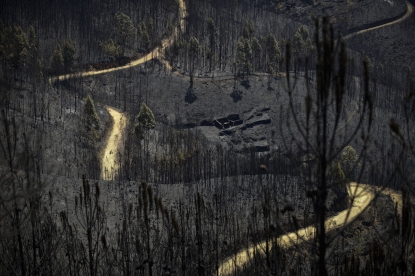 (AFP / Miguel Riopa)
(AFP / Miguel Riopa)At the LGBT parade, with temperatures reaching 42 degrees Celcius (107 Fahrenheit) my colleagues and I complained about the heat and said we'd have to pay attention over the next few days to any wildfires, which in our experiences often erupted after a heat wave.
“The first to know something calls the others,” we said as we left the parade and headed home.
At 11:15 that evening, a colleague from another agency called. “29 dead at a wildfire in Pedrogao Grande,” he said.
I immediately called Thomas Cabral, one of AFP’s text journalists at the Lisbon bureau, and Jerome Pin, our freelance video journalist. We decided to leave for Pedrogao Grande right away.
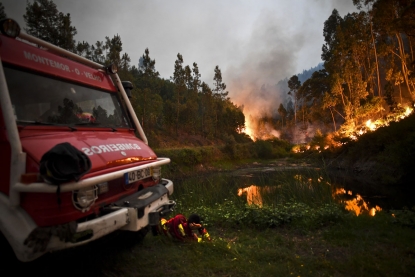 (AFP / Patricia De Melo Moreira)
(AFP / Patricia De Melo Moreira)When we arrived at Pedrogao Grande, we had one objective -- to get pictures of firefighters in action, so that we could show just how serious the situation was.
The main road was blocked, so we went along side roads through villages. Everyone seemed to be outside -- noone dared sleep because the fire was so close.
Eventually we ended up in a field with the pond, where the firefighters were helplessly watching the flames.
There was little that they could do at that point, because the fire was so huge and because it was so deep in the forest. The forest was burning, the firefighters were resting and I tried to capture the unique moment by shooting the flames reflected in that pond.
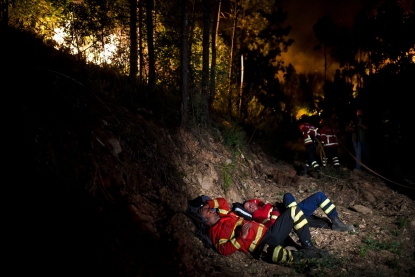 (AFP / Patricia De Melo Moreira)
(AFP / Patricia De Melo Moreira)When the sun came up, we decided to move around the area to gather more information and try to figure out the best place to go. Thomas was driving, Jerome in the front seat and I was in the back, when we got onto the IC8 road. It was blocked, but we managed to follow a column of rescue vehicles.
With the light of day, we saw the burnt forest, destroyed houses and smoke all around as we drove slowly along the road. There was that silence again.
Eventually we came upon some police who told us that there were victims nearby. We stopped the car and went on foot and soon saw a body covered with a sheet in the middle of the a road in the forest, with a policeman nearby.
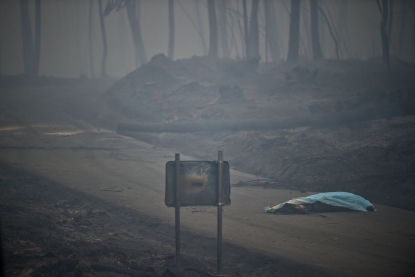 (AFP / Patricia De Melo Moreira)
(AFP / Patricia De Melo Moreira)We took some images and got back to the car. The silence now had a whole new meaning.
We needed to file our pictures, video footage and text, but we couldn’t get any internet connection.
We decided to drive back to a place from where we could file. It was a difficult decision -- both because it’s exhausting driving back and forth and because you could miss an important moment while you’re away. But we needed to file to get the magnitude of the story out there. There is little use of having information as journalists and not sharing it with the outside world. So we drove out to file and then drove back in to keep working. As a team.
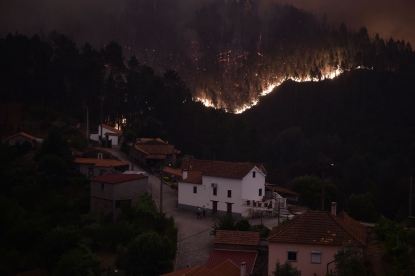 (AFP / Miguel Riopa)
(AFP / Miguel Riopa)We went to the EN-236-1 road, as we heard there had been some casualties there. We found burnt cars and people standing around crying as journalists gathered their accounts of what happened. Some 47 people died here in their cars trying to escape the flames. Thomas would eventually title his text piece “Hell’s Road.”
One woman, her face streaked with tears, waved at me. “Please Miss, come and see how I lost my truck and my car,” she said, sobbing. “I left my house to help the people on the road. People were in flames.”
She grabbed my arm and led me to the front of her house, where a big truck stood covered with ash. Her name was Anabela Silva and she continued talking as I shot the scene. “You can’t imagine what it was like. Noone can. I couldn’t believe what I was seeing. The flames were out of control, we couldn’t save those people. We were all alone, there wasn’t a single firefighter here.”
In the days of reporting that followed, we often heard similar stories of “tornadoes’ of fire.” It seemed that the unusual weather conditions, along with the high temperatures and a thunderstorm, played a key role in the magnitude of the fire.
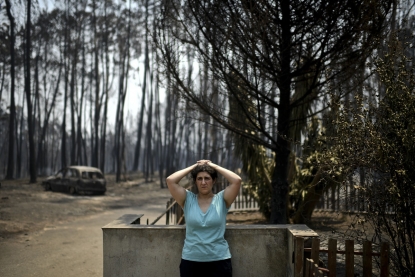 Anabela Silva, June 18, 2017. (AFP / Patricia De Melo Moreira)
Anabela Silva, June 18, 2017. (AFP / Patricia De Melo Moreira)During that first day, the death toll kept rising as the hours passed and even we, who were on the ground, couldn’t really grasp the enormity of what had happened.
My long first day of covering the wildfire ended in a hotel room in Castelo Branco.
Things change when you are finally alone in a hotel room after a day like that. So many hours of work in such difficult conditions, in heat that you could hardly support. The decisions to make, the stress to handle, the fears to master -- these were all so difficult to deal with. But we managed to keep our heads above water and focus on the work. Meanwhile reinforcements arrived from Spain and Lisbon, as it had become such a major story.
But when you’re alone in your hotel room, the adrenaline gone, you’re suddenly alone with your thoughts and memories. Exhausted, you try to sleep, but images from the day keep popping into your head. It’s the last thing that you do before you fall asleep and it’s not easy.
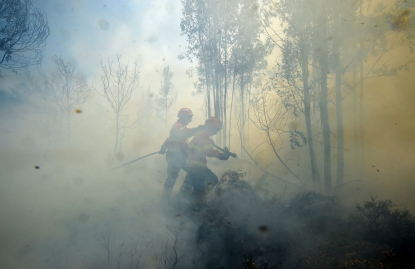 (AFP / Miguel Riopa)
(AFP / Miguel Riopa)The next few days were a blur of wildfire combat during day and night, the exhaustion on the firefighters’ faces, the smell in the air, the smoke in your eyes, the difficulty breathing and of course the stories that you heard. There were so many, they were so strong, they hit you directly in your heart, but you couldn't deal with the emotion until you were alone in your hotel room at night.
I held back tears as I listened to so many people say they didn’t know how they would restart their lives. So many lost family members, friends, belongings. So many of them were in shock, feeling hopeless and helpless.
Following the fires, a lot of questions were asked about where the responsibility lay. I have my own strong opinions on the matter. We tend to talk about wildfires only during wildfire season. But it’s not just a question of fighting the fires, it’s a question of preventing them. Trees like eucalyptus are extremely flammable, but great for the paper industry. Perhaps we should start talking about this. Hopefully some of my work can help trigger change.
For me, covering wildfires will never be the same. I will be more conscious of the danger, more aware. And I now have even more respect for the fearless firefighters who battle these flames. And I hope to never again see so many casualties and lives destroyed. To never again hear the silence of the inferno.
This blog was written with Yana Dlugy in Paris
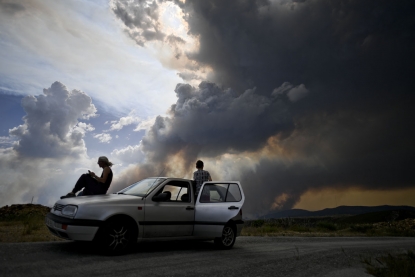 (AFP / Patricia De Melo Moreira)
(AFP / Patricia De Melo Moreira)



